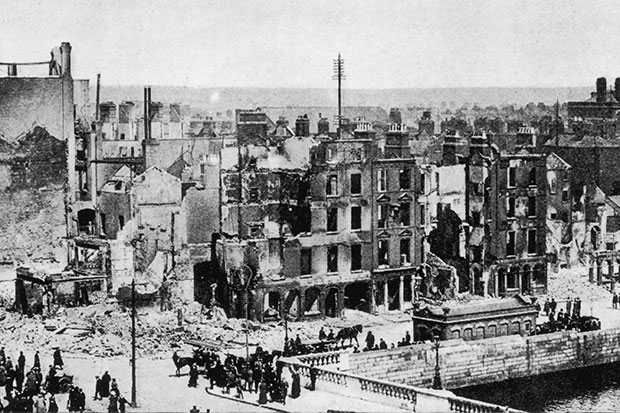As Lytton Strachey remarked of the Victorian era, writing the history of the Irish revolution is inhibited by the fact that we know too much about it. As the centenary of the 1916 Rising approaches, an avalanche of books, articles and television programmes is bearing inexorably down; even the re-enactments have begun, with Dublin’s city centre taken over last Easter Monday by jolly crowds in period dress, celebrating ‘the Road to the Rising’. No one got shot, no buildings were blown up, and no shops were looted, but it was the thought that counted, and everyone had a good time. As Arthur Koestler wrote long ago in a classic article on ‘The Political Libido’, commemoration is all about self-identification, and every US citizen has to feel as personally proud of the War of Independence as if he or she had fought in it.
Though today’s Irish citizens are equally proprietorial about their revolution, its history presents a less clear-cut picture. Popular support for the 1916 rebels was extremely limited at the time, especially among the populace whose sons and brothers were fighting the revolutionaries’ ‘gallant allies’ in France: the planning of the Rising was heavily contingent upon German aid, though this was strategically downplayed afterwards. So was the fate of the constitutional-nationalist Home Rule party, just as much ‘the enemy’ to the revolutionary generation as the Brits, despite the fact that the Home Rulers had got a Home Rule bill passed in 1912–14, and were desperately trying to negotiate around Ulster’s intransigent resistance.
After 1916 the rapid execution of the rebel leaders, and a number of boneheaded decisions by the British government and their military advisers, handed the advantage to the nationalists. Sinn Féin swept the polls at the 1918 election, paving the way for guerrilla warfare and a divisive treaty in 1922, setting up an Irish Free State within the Commonwealth, which later became a Republic.







Comments
Join the debate for just £1 a month
Be part of the conversation with other Spectator readers by getting your first three months for £3.
UNLOCK ACCESS Just £1 a monthAlready a subscriber? Log in